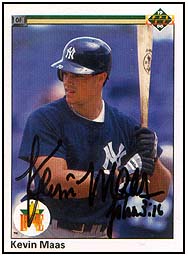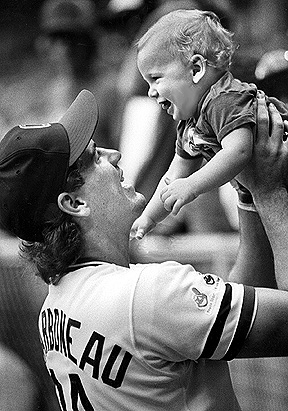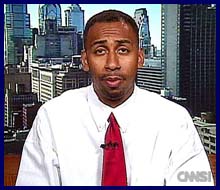As the season draws to a close, YW has assembled a series of expert panels to debate baseball’s postseason honors. This week, we tackle the Rookie of the Year awards.
Dan Shaughnessy
Terry Francona said he wouldn’t do it. Even though The Kid had been called up earlier that day – Craig Hansen, The Future, the flamethrowing wonder who’d blazed a trail of goose eggs through the low minors – Francona expressed his reluctance to use him in a pressure situation. But with the Red Sox down 5-4 to the scrappy Devil Rays on September 19, Francona called on Hansen in the fifth.
Mr. Barely Legal entered the game with the square-jawed confidence that served him so well at St. John’s. Nineteen pitches later, he and his mates trotted off the field. The Rays had gone down in order.
Hansen may not have the dazzling smile of Felix Hernandez or the trendy eyewear of Gustavo Chacin, but when it comes to heart, he has everyone else beat. It’s only been one inning, but stand firm, Red Sox Nation, in your time of need. The Kid is in the picture.
Dan Shaughnessy is a frequent contributor to E$PN the Magazine.
Kevin Maas

Jeff Francoeur. No doubt about it. You don’t need to walk to be a good hitter! When you hit home runs like that, it doesn’t matter whether or not you can take a pitch. Home runs put fans in the seats, and Jeff Francoeur’s going to have himself a nice long career – oh, hey, man, are you gonna eat that?
Kevin Maas hit 21 home runs for the New York Yankees in 1990.
Joe Charboneau

If I’ve got to pick an NL Rookie of the Year, I have to go with Clint Barmes. Back when I was playing, I was kind of a crazy guy – I would open beer bottles with my eye socket, eat spaghetti through my nose, and I once shot myself in the stomach with a pellet gun just to see if I could. On a five-dollar dare from Jack Brohammer in 1980, I even fit an entire baseball into my mouth and spent twelve hours in surgery getting my jaw unhinged.
But let me tell you. You would not BELIEVE the sh-t Clint Barmes does. Filthy, vile, disgusting sh-t – did you believe that deer meat story for a second? Fat chance. I happen to know how he really broke his collarbone, and for the sake of the ladies in the audience, I won’t go into the details.
All I know is this – the kid’s special. Brohammer saw it too. “Super Joe,” he says to me, “there oughta be a picture of that kid’s jaw on the twenty-dollar bill.”
Joe Charboneau was the 1980 AL Rookie of the Year.
Stephen A. Smith

CLEARLY the AL Rookie of the Year should be Seattle’s Felix Hernandez. Thanks to David Stern’s IDIOTIC minimum age limit, THOUSANDS of young men like Felix are out on the streets, looking for work in lesser sports. Think about their FAMILIES, people.
Only in AMERICA do we stop young athletes from earning an honest living, and quite frankly, it SICKENS me. It’s a black mark on the face of basketball that a natural point guard like Felix Hernandez is pitching to guys named Alfredo instead of dishing dimes to my boy A.I.!
The sickening crimes perpetrated on baseball by Bud Selig are only exceeded by those forced upon the NBA by David Stern. Giving this award to Felix Hernandez is the only way to SLAP Commissioner Stern in the face and make it clear that this will NOT be tolerated.
Stephen A. Smith is the host of “Quite Frankly” on E$PN.
Mitch Albom

In New York, Houston Street is the dividing line between trendy, new-wave NoHo and so-90’s-it’s-sick SoHo. In Oakland, Huston Street is the difference between the A’s lackluster first half and another season in the playoff hunt. On a team of hard-nosed scrappers, Street is like a one-eared puppy dog fighting for his share of the Alpo. His teammates call him their anchor, the glue that holds their bullpen together. But Huston Street is more than that. He might just be an American hero.
When Huston Street heard about the tragic events of Hurricane Katrina, he took it personally. Born and raised in Austin, Texas, Street had a lifelong connection to the victims of the Gulf coast. So he did what any patriot would do: he called upon his family – sisters Elizabeth and Chrystie, and brothers Allen and East Broadway – and the five of them journeyed down to beleaguered Baton Rouge with a truckload of generators. When the Streets got there, grateful hurricane survivors exchanged large sums of money for the precious generators.
“We felt that it was important to reinforce the traditional values of this country,” admitted Street. “Charity can only go so far before it becomes a crutch; we could see in those people’s eyes that they were glad to know that capitalism was alive and well.”
What’s more American?
Mitch Albom sometimes cries himself to sleep at night.

excellent. too bad you had to give Mitch the right answer.